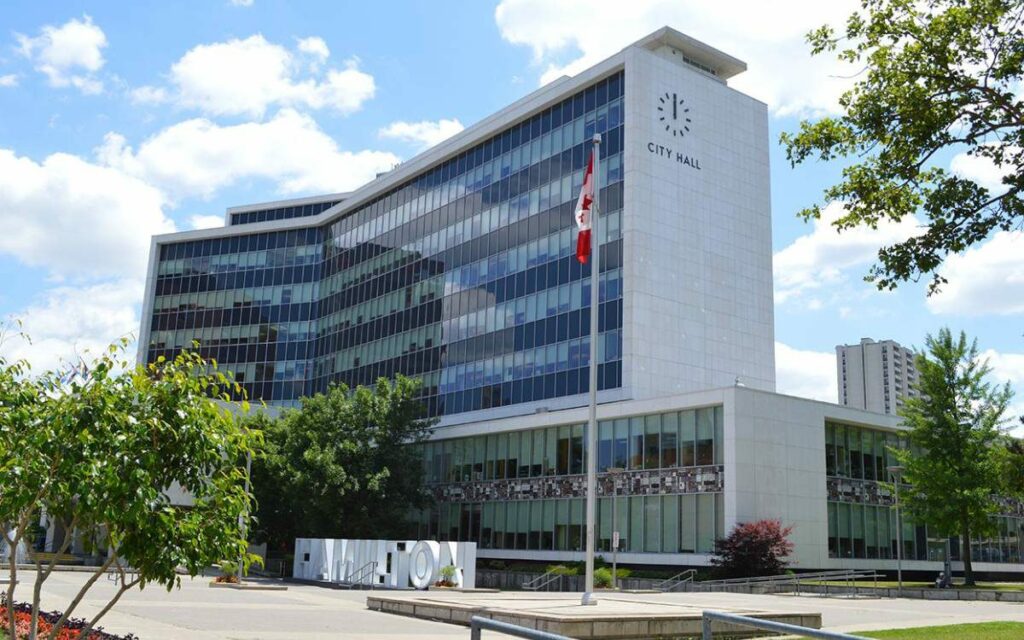
Those in favour of keeping the exemptions say that the city is disincentivizing new developments and the tax revenue that those new builds bring. Photo Credit: City of Hamilton/X.
Hamilton City Council recently voted to phase out long-standing development charge discounts meant to encourage new builds.
However, the phase out of the development charge exemptions is slower than originally proposed.
Development charges are one-time fees paid by developers at the time a building permit is issued to help pay for municipal services to new developments, such as roads, transit, water and sewer infrastructure, community centres and fire and police facilities.
While Council sees the ending of the discounts as a way to recoup money, those in favour of keeping the exemptions say that the city is disincentivizing new developments and the tax revenue that those new builds bring.
The decision came after the city retained Watson and Associates Economists Ltd. (Watson and Associates) to conduct a development charges study beginning in 2022.
The City of Hamilton’s development charges bylaw was set to expire in June 2024.
There is currently a 70 per cent discount for downtown office development, 40 per cent for all downtown non-residential, 40 per cent for downtown residential, and 37 per cent for all industrial development.
Watson and Associates recommended no change to the downtown office development discounts, but suggested an immediate cut to downtown residential exemptions to 20 per cent in June 2024 followed by an additional five per cent discount reduction every year after until phased out.
Watson also recommended an immediate end to the industrial development exemptions, only maintaining the 37 per cent discount for manufacturing and production and artist studios.
After hearing from stakeholders, City Council ultimately decided to continue the discount phase out, but at a slower rate than proposed by Watson.
As a result, the 40 per cent discount for downtown development will continue until May 31, 2025, decreasing to 35 per cent on June 1, 2025, 30 per cent on June 1, 2026, and decreasing by 10 per cent every year after that until phased out.
The exemption for industrial development will remain at 37 per cent until June 1, 2025, when it will be reduced to 32 per cent. The discount will then be reduced by five per cent every year after that until phased out.
Between 2021 and 2023, the City of Hamilton reportedly collected an average of $101.7 million in development charges per year and exempted an average of $56.1 million.
In a letter to Hamilton City Council, Julie Sergi, President-Elect of the Realtors Association of Hamilton-Burlington warned against reducing the exemptions, saying, “Increased labour costs, building materials, and interest rates are making a growing number of housing projects unfeasible. We are seeing desperately needed housing projects deferred, even with the current Residential Downtown CIPA exemptions.”
“Removing the exemptions will only exacerbate the problem. As such, this may be the worst time to remove or reduce exemptions and add costs to developing much-needed housing,” she continued.
“Forgoing a percentage of development charges may seem like a loss of municipal revenue, but we must also consider the long-term gain of year-over-year increases in property tax revenue.”
“Underused lots bring in substantially less annual property taxes than a high-rise, multi-unit residential building.”
“For example, a downtown lot where a 931-unit building is under construction has been earning the city approximately $20,000 in annual property taxes. However, once completed, the residential units will increase the taxes collected to approximately $2,000,000 annually.”

Based in Hamilton, he reaches hundreds of thousands of people monthly on Facebook, Instagram, TikTok, and Twitter. He has been published in The Hamilton Spectator, Stoney Creek News, and Bay Observer. He has also been a segment host with Cable 14 Hamilton. In 2017, he received the Chancellor Full Tuition Scholarship from the University of Ottawa (BA, 2022). He has also received the Governor General’s Academic Medal. He formerly worked in a non-partisan role on Parliament Hill in Ottawa.






